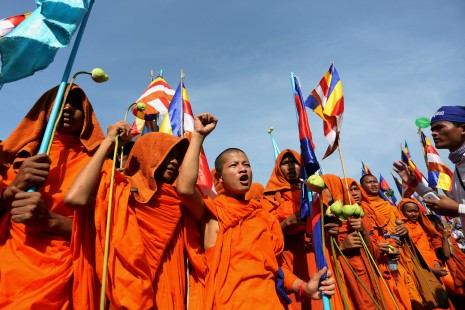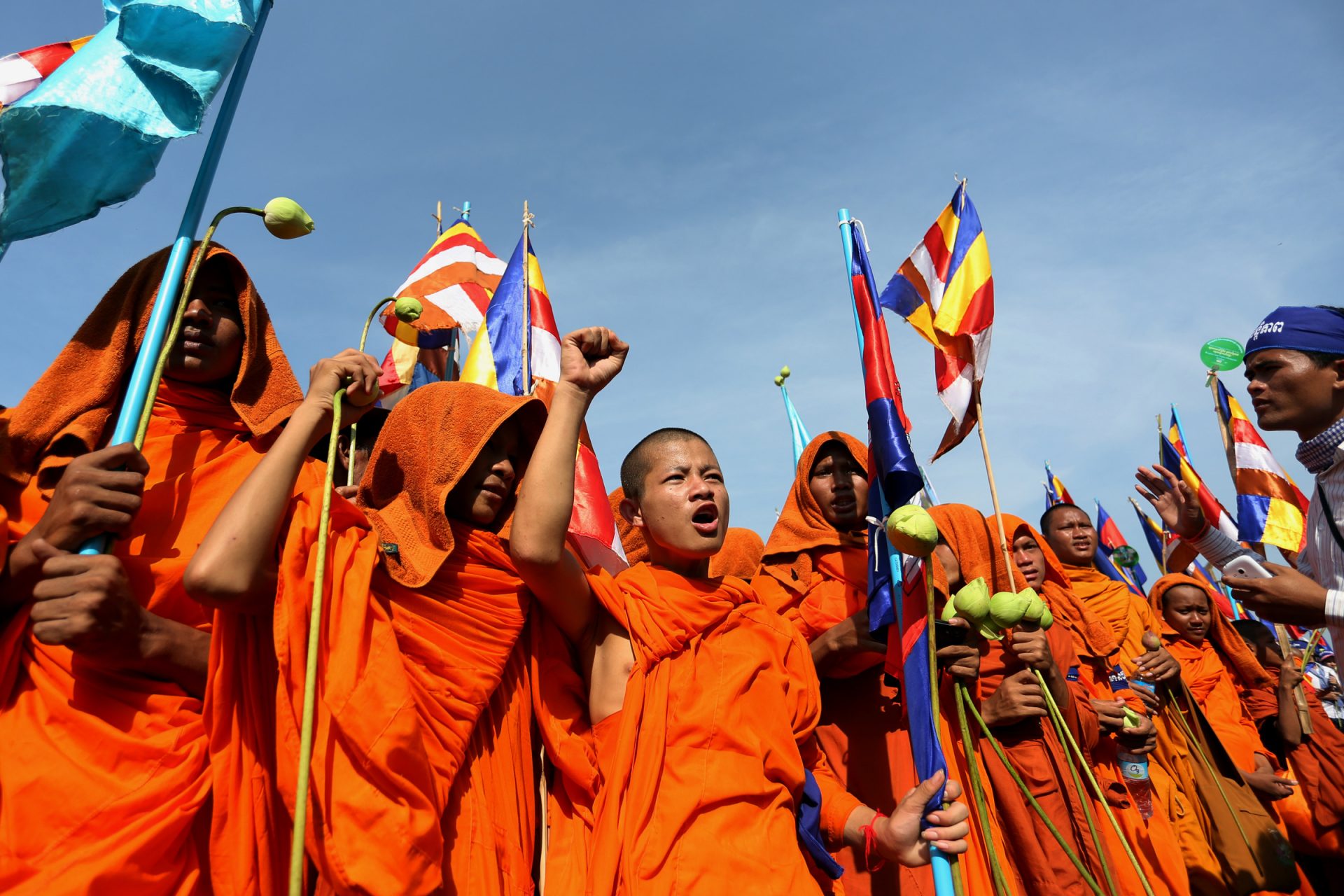Rights groups on Tuesday called on the government to speed up judicial reform, end land grabs, ensure basic labor rights and address a host of other concerns as the world marked 65 years since the Universal Declaration on Human Rights was drawn up.
But what had been a peaceful International Human Rights Day ended on a sour note last night when the road between Monivong Boulevard and Wat Phnom was blocked off and hundreds of military police and riot police broke up a small sleep-in outside the U.S. Embassy, which spurred a separate group of youths to lob stones and several Molotov cocktails.

Earlier in the day, a small group of protesters had gathered and erected CNRP flags outside the U.S. Embassy, which is adjacent to Wat Phnom, where a large human rights day rally was being held.
A representative of the U.S. Embassy protesters said they would not move until Prime Minister Hun Sen stepped down.
CNRP lawmaker-elect Mu Sochua arrived and appealed to the crowd to disperse, saying that they were not linked to the CNRP’s protest, but she eventually left as the protesters ignored her entreaty.
“She came here just to intimidate us,” a protester said of Ms. Sochua, adding that the group would be spending the night outside the embassy. But when night fell, the group, which had shrunk to about 12 people sitting on mats with candles, was being asked to leave by Daun Penh district security forces, while at nearby Wat Phnom, several hundred riot and military police stood waiting for orders.
Eventually, the security guards bundled the small group of protesters onto trucks. Rights group Licadho said they were later deposited, unharmed at a pagoda in Russei Keo district.
Military police spokesman Brigadier General Kheng Tito said Interior Minister Sar Kheng had told authorities Tuesday to “be careful” in handling security matters outside the embassy.
Across Phnom Penh on Tuesday, different groups, political parties and Buddhist monks marched or held gatherings that sought to celebrate human rights and highlight the ways in which citizens are being denied them.
The Cambodian Human Rights Action Committee, a consortium of NGOs, released a joint statement saying that the government “has an obligation to promote, respect and fulfill” internationally recognized human rights, and calling for an end to forced evictions and the opening of more public spaces for people to gather.
The U.N. Office of the High Commissioner for Human Rights called for mechanisms of accountability, a rights-based approach to transparency and broader participation in decision-making, “which would improve the chances for successful reform.”
Tuesday’s events started with hundreds of monks and civilians —many of whom had marched from the provinces over the previous 10 days—defying City Hall orders by marching to the National Assembly to submit a petition to demand an end to human rights abuses.
Armed police and military police stood nearby, but the crowd dispersed by midday with the petition undelivered, as there was no one working at the Assembly on Tuesday who could accept it during the national holiday.
The Venerable But Buntenh, head of the Independent Monk Network for Social Justice and a leader of the monks’ marches, said that despite not being able to physically hand over the thousands of complaints to the Assembly, he was confident that Prime Minister Hun Sen and his ruling CPP would hear the group’s message.
“They will hear because now the media is so strong,” But Buntenh said. “I believe that if we talk bad to Mr. Hun Sen, immediately he will react…. I believe he listens every time.”
Moeun Tola, head of the Community Legal Education Center’s labor rights program, said the complaints collected by the marchers would be delivered to the CPP and CNRP in due course.
Earlier in the day, CNRP President Sam Rainsy emerged from his party’s headquarters in Chak Angre Loeu commune at about 8 a.m.
Flanked by opposition lawmakers-elect and supporters, he led a few hundred supporters on a march to Freedom Park that snaked along Monivong Boulevard.
“We…march asking for the respect for human rights in Cambodia,” he said as he left his party’s offices. “It will be peaceful and completely nonviolent.”
Mr. Rainsy’s march also went ahead unimpeded, despite Sunday’s warning by the Ministry of Interior that marching was banned in the city.
At the intersection of Monivong and Russian boulevards, Mr. Rainsy’s march was met by another led by his deputy, Kem Sokha, which had started in Tuol Kok district.
Addressing about 5,000 supporters in nearby Freedom Park, Mr. Rainsy insisted that the CNRP was the true victor of July’s national election. He also told the crowd that their right to vote had been tampered with in what had been a fraudulent election.
Speaking again to several thousand people gathered at another human rights day event at nearby Wat Phnom, Mr. Rainsy garnered a number of cheers from the crowd when he championed change in workers’ salaries.
“There are three different events today, but they all have the same common goal, which is for human rights,” he said.
“We need to respect the rights of unions and assemblies in factories,” he added.
At the Olympic Stadium, Phnom Penh governor Pa Socheatvong told at least 600 residents and NGO representatives that it was his intention to see ties between the city and civil society groups strengthened, and defended his decision to deny permission for the monks and CNRP to march in the city.
“In the past few days we have received criticism from public opinion. Marches have been made aiming to demand fundamental rights. But marchers have been violating the rights of others,” Mr. Socheatvong said, adding that traffic congestion caused by marchers was one such rights violation.
(Reporting by Phorn Bopha, Mech Dara, Lauren Crothers, Khy Sovuthy, Matt Blomberg and Kuch Naren)




